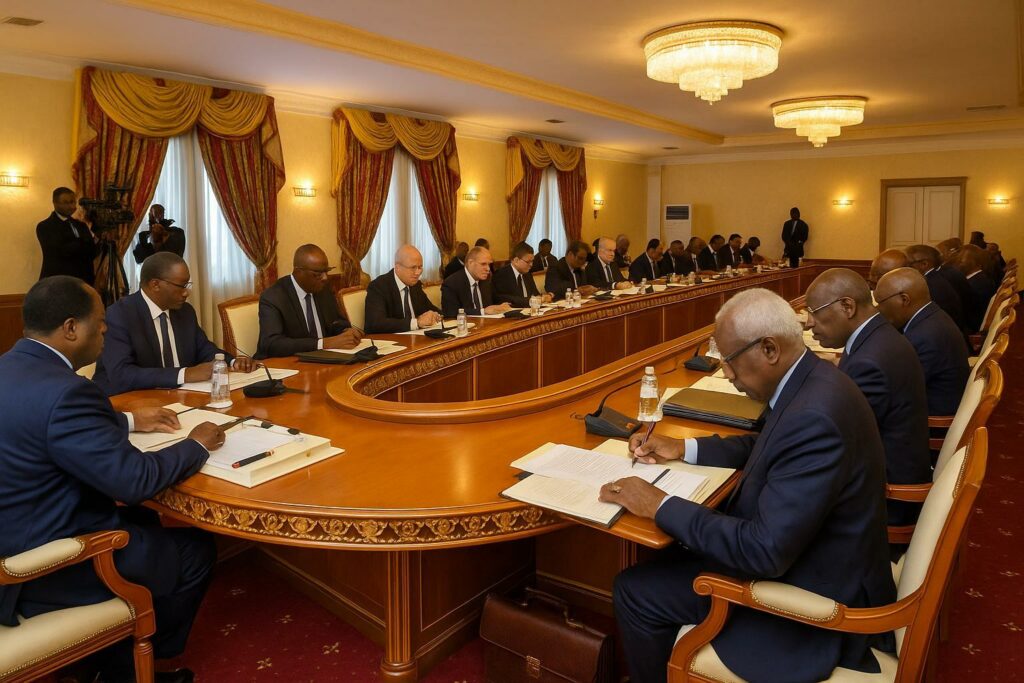Presidential Council Sets Reform Tempo
Barely two hours sufficed for President Denis Sassou Nguesso to steer the 3 November 2025 Council of Ministers toward an agenda dense with legal modernisation and diplomatic positioning. From the ornate Salle des Banquets of the Palais du Peuple, the Head of State opened the session at 10:00 before closing it at noon, projecting an image of determined efficiency relayed by Government Spokesperson Thierry Lézin Moungalla in an official communiqué released the same afternoon.
While routine in form, the gathering proved substantive in content. Three draft laws, one draft decree, a ministerial communication on climate engagement, plus a series of high-level appointments placed economic diversification, public safety and international visibility under a common spotlight. Observers from the diplomatic corps present at the post-cabinet briefing noted that the tone was « resolutely technical », echoing the President’s repeated calls for “rigour and credible execution”.
Mineral Code Overhaul Heralds Investor Clarity
The most anticipated text, a sweeping Mining Code presented by State Minister Pierre Oba, seeks to reconcile national sovereignty over sub-soil wealth with competitive conditions for foreign capital. Drawing on experiences in Ghana and Namibia, the bill introduces a production-sharing regime, obliges companies to open ten percent of equity to Congolese shareholders and institutes a computerised cadastre intended to curb speculative licence hoarding.
A noteworthy innovation is the creation of an escrow account grouping thirty percent of funds earmarked for local development projects, a mechanism inspired by the Extractive Industries Transparency Initiative guidelines. By embedding community benefit directly into the financial architecture, Brazzaville signals that social licence to operate is no longer negotiable, a point repeatedly emphasised by Mr Oba in media comments after the session.
Industry analysts contacted in Pointe-Noire underline that the forthcoming parliamentary debate will test the balance between fiscal attractiveness and developmental imperatives. Yet preliminary reactions from the Chamber of Mines describe the text as “predictable and bankable”, especially with the explicit promotion of in-country beneficiation that could catalyse new smelting and fabrication ventures.
Civil Aviation Reform Anchors Safety Agenda
Transport Minister Ingrid Olga Ghislaine Ebouka-Babackas secured cabinet backing for two complementary instruments designed to elevate Congo’s safety record in line with International Civil Aviation Organization (ICAO) audits. The first law establishes the National Authority for Investigation and Analysis (ANEA), an administratively autonomous body empowered to probe air incidents with the requisite independence long advocated by insurers and regional carriers.
The accompanying decree updates the statutes of the National Civil Aviation Agency (ANAC), aligning internal procedures with the revised CEMAC Civil Aviation Code adopted in Libreville earlier this year. According to senior ANAC officials, the reform tightens licensing, airport security and airworthiness oversight, a triad considered pivotal by regional hubs competing for traffic diverted from saturated West African corridors.
Aviation consultant Hervé Nguimbi anticipates a virtuous circle: “Stringent oversight lowers risk premia, which in turn attracts new routes and maintenance investors.” The minister echoed that logic, stressing that safety is the “first asset” in an industry where reputation travels faster than aircraft.
Climate Diplomacy Elevates Brazzaville 2028
Beyond sectoral legislation, the Council devoted attention to the communiqué presented by Environment Minister Arlette Soudan-Nonault on Congo’s participation in the second African Climate Summit held in Addis Ababa in September. The delegation’s successful bid to host the third edition in Brazzaville in 2028 was hailed by the cabinet as a “continental endorsement of Congo’s custodianship of the world’s second-largest tropical forest”.
Securing the summit engages more than prestige. Preparatory documents reviewed by our newsroom indicate infrastructure upgrades to the Maya-Maya conference precinct, enhanced broadband capacity and the creation of a carbon finance hub as envisaged under the Blue Congo Basin Initiative. International partners, including the Global Environment Facility, have already signalled preliminary interest, positioning Brazzaville as an emergent pole in climate negotiations.
Strategic Appointments Strengthen Governance
The President proceeded to reshape key administrative levers. In public health, Dr Edouard Ndingha was designated Inspector General, while Professor Clotaire Itoua assumes leadership of population management. Two major referral hospitals, Adolphe Sice and Loandjili, fall under the stewardship of Colonel Lézin Didier Cyriaque Goubakouly and Mr Casimir Ondonda respectively, whereas the Mother-and-Child specialised facility is now entrusted to Dr Philestine Clausine Rochelvie Mikolele Bilombo.
Industrial competitiveness also gains a fresh impetus through the appointment of Dr Jean Ignace Tendelet as Permanent Secretary of the National Committee for the Business Climate and Public-Private Support, assisted by Ms Gouadi-Bouzimbou Koussiama. Education policy, a longstanding presidential priority, will henceforth rely on Rémy Alain Blaise Boumba at the head of non-formal literacy programmes, a move anticipated to accelerate adult education in hinterland districts.
À retenir
The day’s decisions converge on three vectors: enhancing legal predictability for investors, tightening regulatory frameworks in high-risk sectors and augmenting Congo’s international stature through climate diplomacy. Coupled with targeted appointments, the reforms aim to secure execution capacity across ministerial lines, reinforcing the administration’s pledge to translate policy into tangible outcomes.
Le point juridique
From a strictly legal standpoint, the new mining bill redefines the hierarchy of fiscal instruments by embedding a production-sharing contract into statute, thereby providing direct enforceability before national courts rather than relying solely on contractual arbitration. The aviation package, conversely, exemplifies the technique of ‘double normativity’: legislation to create an investigative authority and regulatory decree to adapt an existing agency, a sequencing that preserves parliamentary prerogatives while ensuring swift administrative alignment with supranational CEMAC obligations.
Constitutional scholars consulted point out that the measures respect Article 102 on natural resource sovereignty and Article 13 on the right to a safe environment, reinforcing a coherent constitutional narrative. Should Parliament adopt the texts without major amendments, Congo would possess one of the most contemporary sets of sectoral codes in the sub-region, potentially influencing harmonisation efforts within ECCAS.

